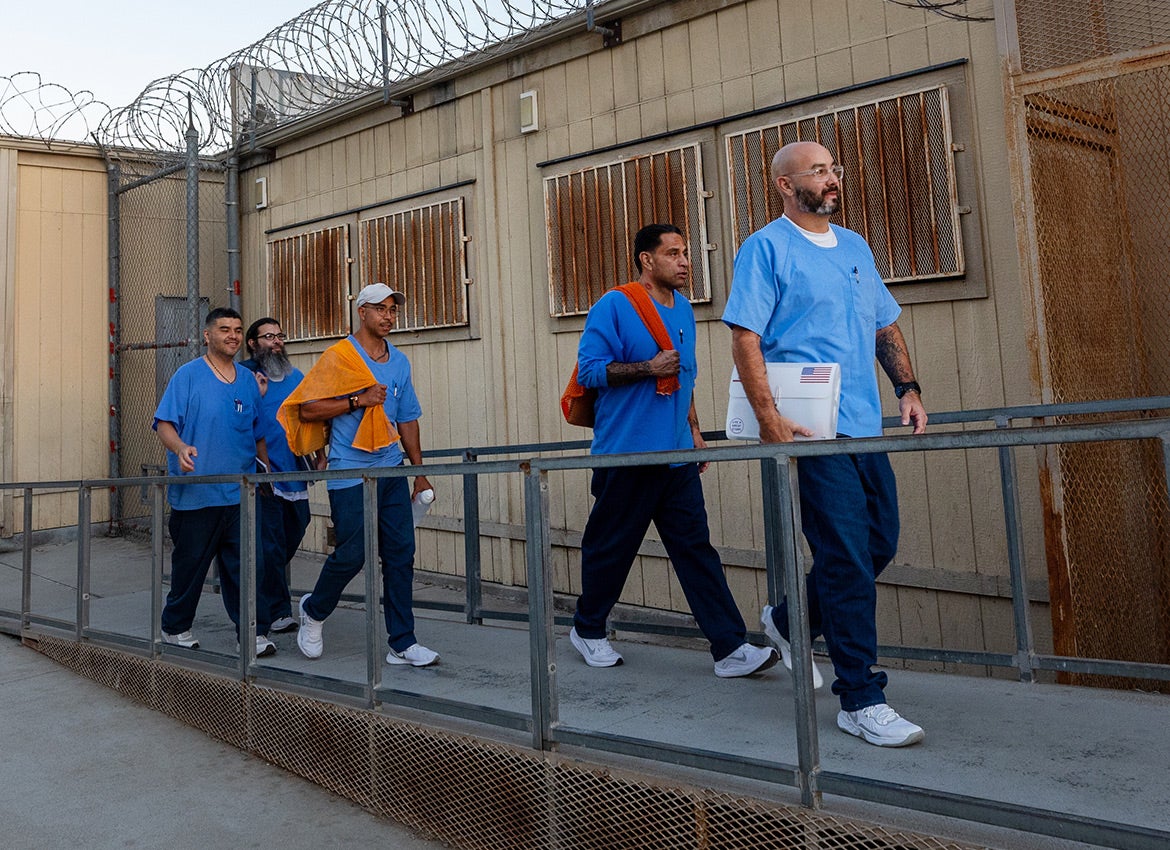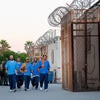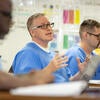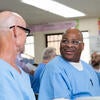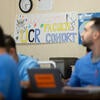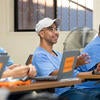Lifted Through Learning
A new UCR-led degree program is providing transformative opportunities to incarcerated students as they prepare to return to their communities
By David Danelski | Photos by Stan Lim
F arah Godrej began her class with a meditation, urging her students to find comfortable postures.
“We’re leaving all the stresses of the day — any problems, any anxieties — we’re just leaving them outside,” said the UC Riverside political science professor. “We’ve entered a space of refuge, and we’re together with each other in community today.”
The students, all men, sat in silence behind desks arranged in a half-circle and focused on deep breathing. Their ages spanned generations, yet they all wore the same blue shirts and pants. Through a window, guard towers and coils of barbed wire on top of tall fences could be seen in the fading evening light. Yet, for the next hour or so, the trappings of the California Rehabilitation Center in Norco seemed to melt away.
Godrej is one of several UCR professors teaching classes that, for the first time, allow incarcerated students in Norco to work toward a Bachelor of Arts degree in education, society, and human development, with a concentration in social justice. The students are part of UCR’s new prison education program, UCR LIFTED — short for Leveraging Inspiring Futures Through Educational Degrees.
The class has a palpable sense of optimism — a place to close the door on the realities of prison life and open a new one to possibilities that once seemed unimaginable. This sentiment was shared by several of the students, all of whom have two years or less remaining on their sentences and will soon return to their communities.
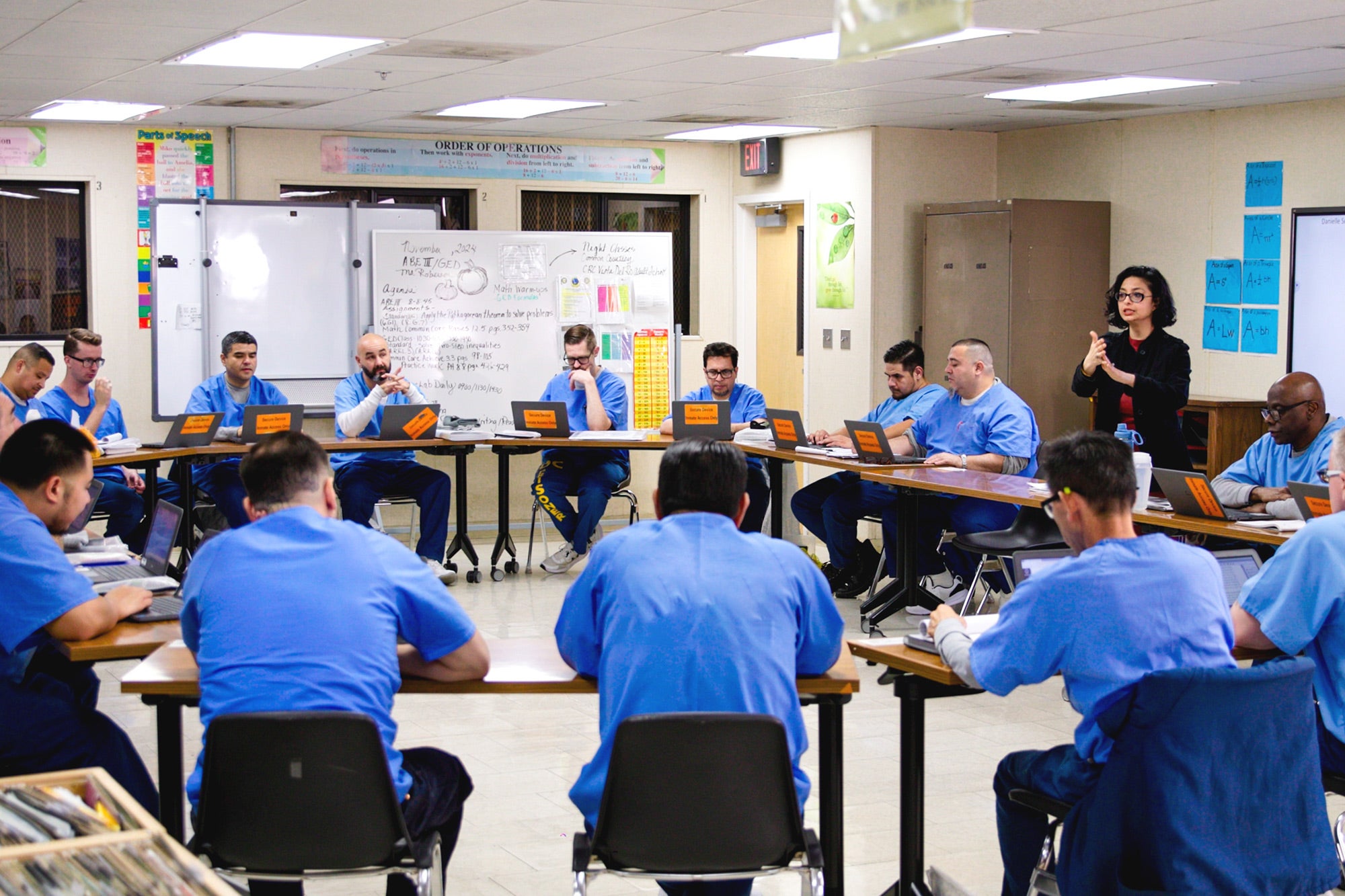
“They see us as human beings, and that’s not something I’m very used to. In the prison environment, we become a number,” said student Mathew Witecki. “When UCR came in, I felt seen and understood. We have an amazing opportunity … I feel blessed to be able to get a degree from UCR because it’s going to carry me into the higher levels of education I need to enable me to have a fruitful impact on society.”
During a class discussion, Cordell Jones, a student in his 50s, challenged the author of one of their reading assignments who claimed that domestic violence crimes were more prevalent in economically disadvantaged communities of color. Conviction rates may appear to support such a claim, Jones argued, but similar crimes in affluent white communities are just as common — though far less likely to be reported, prosecuted, or result in jail time.
“Those who have lots and lots of money — their offenses just don’t get reported,” Jones said. “And when some do, most of the time, it gets pushed underneath the rug. They just go to community service or pay sums of money. And then those in poor communities — they do the time.”
Before class, Jones had spent hours reviewing publicly available court cases, analyzing offenses and sentencing outcomes. Godrej credited him for moving beyond anecdotal evidence before drawing conclusions.
“In the case of going through court records, is more better?” Godrej asked her students.
“Yes,” several responded in unison.
“Yes,” she said in agreement. “The more cases and data we can gather, the better chance we have of approximating reality.”
UCR LIFTED is administered by UCR’s School of Education, with faculty from the College of Humanities, Arts, and Social Sciences also teaching in the program. It is modeled after a similar UC Irvine program that began offering college classes inside the Ronald J. Donovan Correctional Facility in San Diego County in 2022. All students participating in UCR LIFTED had previously taken prerequisite community college courses available in the prison, met UCR admission standards, and most will be eligible for tuition remission through UC’s Blue and Gold Opportunity Plan.
Godrej and Amos Lee, an assistant professor of teaching, spent roughly a year overcoming procedural hurdles, both at UCR and the Norco facility, to get UCR LIFTED off the ground. The pair, who are the co-founding directors of the program, and other participating faculty also had to tackle logistical issues, such as prison rules limiting technology. A breakthrough came in 2023 when Joi Spencer, then in her first year as dean of UCR’s School of Education, approved and embraced the program, and UCR LIFTED launched its first Norco classes in the fall of 2024.
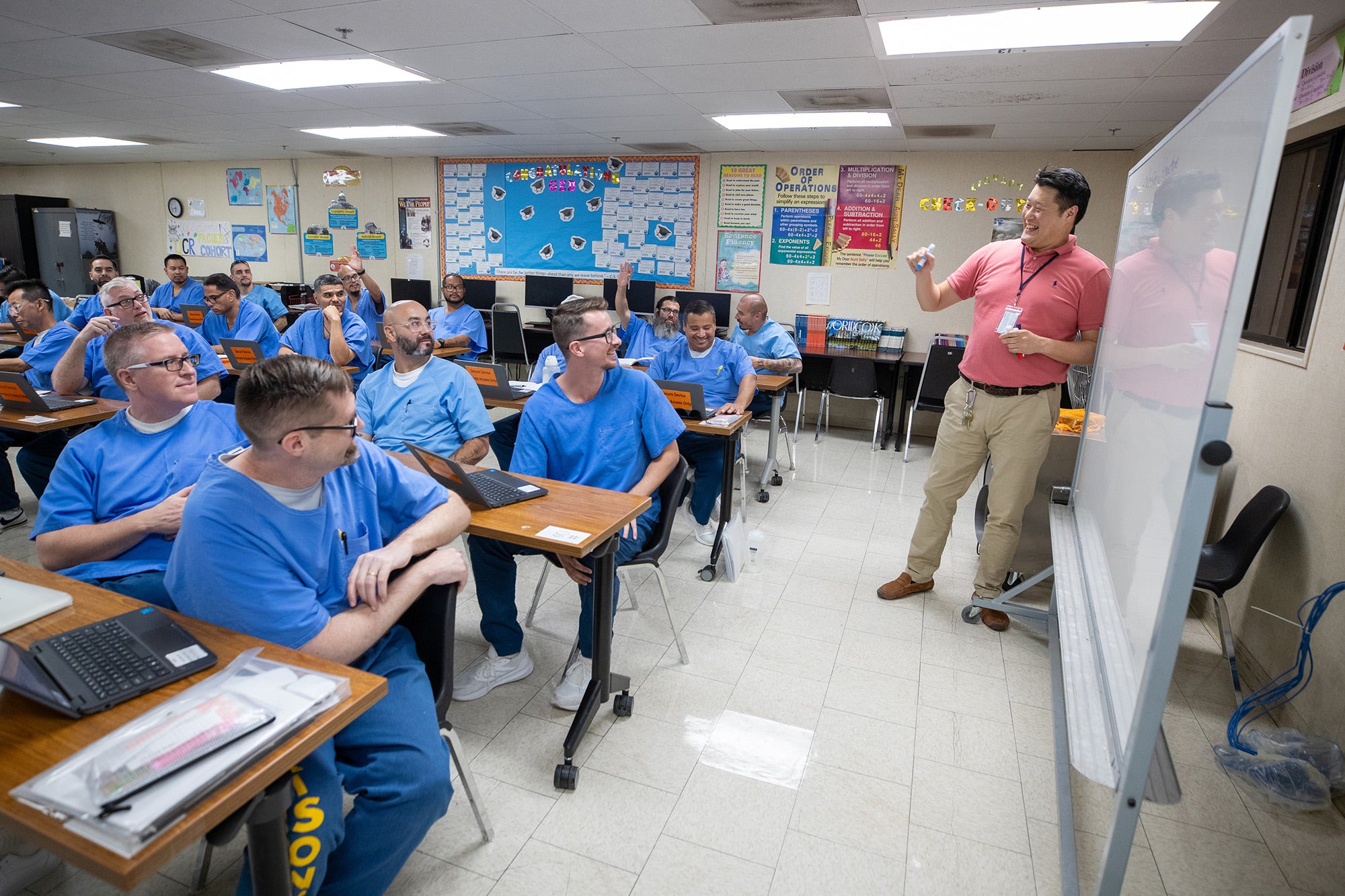
“Extending this opportunity to students behind bars is a logical and prescient expansion of UCR’s mission, further expanding its reach in the target area of Inland Southern California,” Lee said.
Their mission goes beyond helping prevent those who have been incarcerated from returning to prison after release.
“We don’t want to link our work to the idea that BA programs are good just because they reduce recidivism,” Lee said. “There are broader goals to offering BAs in prison systems than just this one metric.”
According to Lee, at least 95% of people incarcerated in California will return to their communities. Providing access to a UC college degree can enhance opportunities available after they are released, which can allow for economic security and more fulfilling lives for them and their families.
And he couldn’t ask for more highly motivated students. “A lot of the incarcerated people that I work with — one of their biggest fears is that they’ll be treated differently because they’re incarcerated,” Lee said. “In fact, they often do more work inside the prison than some of our students on campus.”
As he sat in a folding chair in a drab hallway of the Norco prison classroom building, Cordell Jones recounted his childhood in the South Bronx. He credits his mother, a primary school teacher, with teaching him to read at age 3, sparking a lifelong love of reading and learning. But his early years were far from stable. His mother developed a heroin addiction, and he was sent to live with an aunt who provided him with the stability he needed.
Still elementary aged, he was bused to a school in a white suburban area as part of a racial integration program. There, he said, he was traumatized by white teachers who made him feel like he didn’t belong and that he wasn’t smart. The experience shattered his sense of trust. Fortunately, his mother eventually overcame her addiction. She continued to give him books, nurturing the reading habit that would carry him through the darkest chapters of his life.
“She recovered,” Jones said of his mother. “She showed me that I can survive anything.”
Without completing high school, Jones joined the military to escape crime and poverty in his neighborhood. He first enlisted in the Army, later transferring to the Marine Corps. He served at Camp Pendleton and recalled exciting moments from his military career, including a boot camp graduation attended by President Ronald Reagan and missions supporting foreign fighters resisting the Soviet Union’s intervention in Afghanistan during the 1980s. His service took him to Germany, Italy, France, Japan, and Egypt, and he received presidential commendations, he said.
Despite these achievements, Jones left the Marines without a diploma and struggled to reintegrate into civilian life. Facing prolonged bouts of unemployment, he slipped into a cycle of crime and eventually became involved in drug trafficking. He traveled extensively throughout California before being arrested in San Diego at age 27. He has been incarcerated twice.
In recent years, Jones has developed a deep commitment to change, learning, and helping others. He has embraced prison education programs and said he found purpose in studying and research. He now holds a GED diploma, has earned eight associate degrees, and helps other students as a teaching assistant in GED classes inside the prison.
Hear students participating in UCR LIFTED share how the program has impacted their lives and goals for the future.
Now Jones is working toward a bachelor’s degree through UCR LIFTED, which he expects to complete after his release. He plans to continue his coursework on campus at UCR, then pursue a master’s and ultimately a doctoral degree in education. Jones credits the program with helping him advance his education and deepen his understanding of racial inequalities in the criminal justice system.
With the knowledge he’s gained, Jones aims to address issues such as institutional racism, social and economic inequities, and systemic bias — factors that disproportionately impact Black and Hispanic individuals. The UCR program, Jones said, is a concrete step toward his goal of helping formerly incarcerated people rebuild their lives through entrepreneurship, education, and social support. He is also passionate about restorative justice — a process that rehabilitates offenders by reconnecting them with their victims and communities.
“I’m looking into working for or starting some type of restorative company,” Jones said. “We would challenge those who were formerly incarcerated to do better. We would actually go out, pick them up, put them to work, and give them different ideas and ways to pursue life.”
The real-world benefits of increasing educational access for students like Jones are in line with Dean Spencer’s goal to expand these kinds of programs in the School of Education. She emphasizes that all the men participating in UCR LIFTED will have served their sentences and are eager to become contributing members of their communities.
“I know from being an educator and educational researcher that a lot of people who end up in prison didn’t have the best start in life,” she said. “I’m not giving anyone any excuses, but when you see someone in that scenario saying, ‘That’s behind me, and I want to do differently — I want to improve my life, my family, and my community,’ I can imagine no greater use of our resources than to help someone restore and recover. I am humbled by this program.”
Expanding College Access in Inland Southern California and Beyond
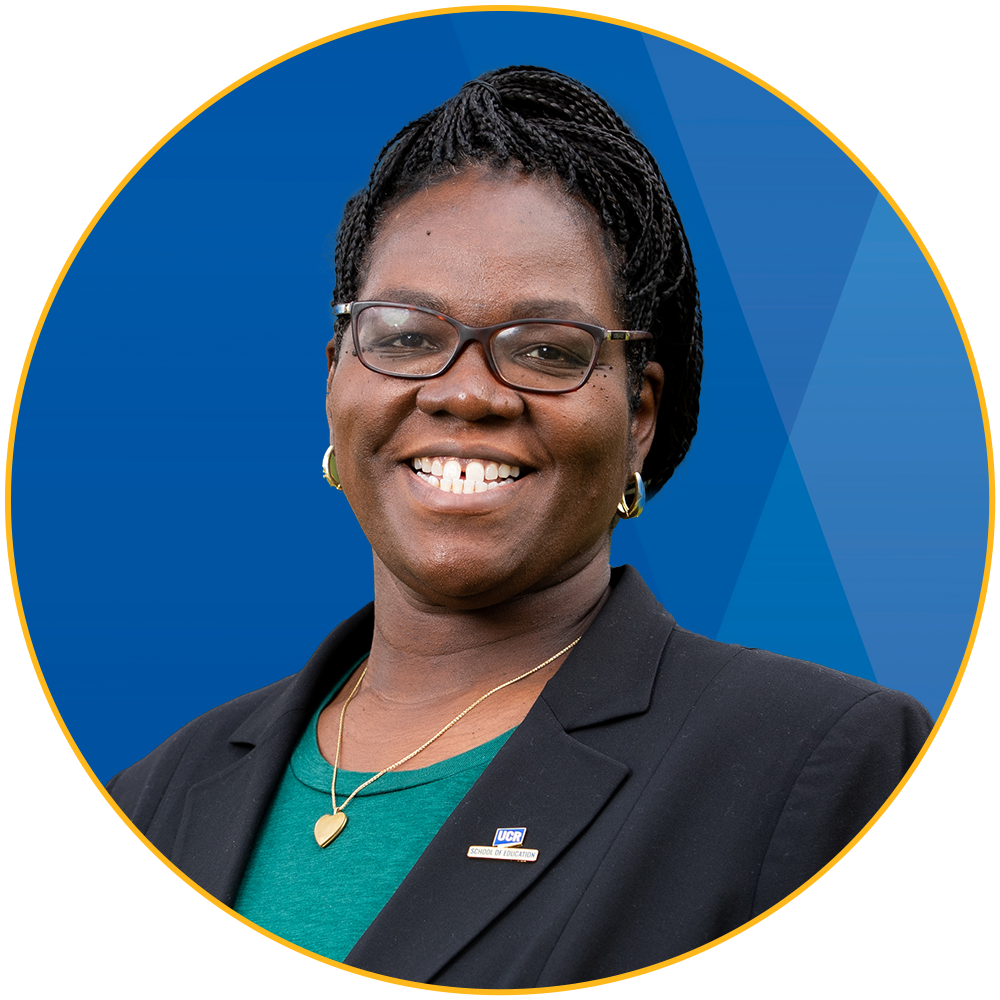
UCR LIFTED is just one of several initiatives launched by the School of Education in the past two years to expand access to higher education.
“Our goal is to remove barriers that prevent talented individuals from pursuing higher education,” said Dean Joi Spencer. “These programs are designed to create direct pathways for students who might otherwise be left out of the college experience.”
The new programs reflect the School of Education’s broader mission to increase social mobility through higher education. By targeting specific barriers — geographic, financial, institutional, and systemic — UCR is working to make college more accessible to historically underserved populations.
“If we can put educators and leaders in front of students who understand their lived experiences, we can open doors that many never even realized existed,” Spencer said.
Here are the new initiatives that are currently or soon-to-be in operation:
Coachella Valley Teacher Pathway
Recognizing a critical teacher shortage in California’s Coachella Valley, UCR established a teacher credentialing program that allows aspiring educators to earn their credentials locally rather than traveling to Riverside. With classes held in Palm Desert, the initiative trains prospective teachers from the community, who later return to local classrooms and serve as role models for the next generation of students.
Teaching Pipeline for High School Students
UCR is also developing a pipeline for high school students who are interested in careers in education.This initiative provides early exposure to teaching, mentorship, and structured coursework to help students transition smoothly into college degree and credentialing programs.
Middle School STEAM Academy
Many middle school students and their families are unaware that they are missing key courses, such as algebra, which are required to apply to the nine undergraduate campuses in the University of California system. To combat this, UCR’s STEAM Academy provides middle schoolers with access to advanced coursework, guidance, and mentorship. The program also works to tackle the placement of students into lower-level courses based on implicit biases related to ethnicity or socioeconomic status.
Doctorate in Educational Leadership
The School of Education will soon be offering a Doctorate in Educational Leadership (Ed.D.) program designed for working professionals, including teachers, principals, community college professors, and nonprofit leaders. This hybrid program focuses on leadership and is aimed at individuals committed to driving change in their communities. Classes will be available online and scheduled during evenings and weekends, allowing professionals to pursue the Ed.D. degree while working full time.
Master’s in Clinical Mental Health Counseling
To address a critical shortage of mental health professionals in the Inland Empire, UCR is developing a master’s program in clinical mental health counseling. This program will train professionals to serve in schools, prisons, rehabilitation centers, and the Department of Veterans Affairs system, expanding mental health services in a region with significant unmet needs.
Join us in advancing equitable educational systems.
Your philanthropic support to programs like UCR LIFTED can provide critical resources to students and faculty shaping the quality of education for generations to come. Give today at donate.ucr.edu/spring2025.
